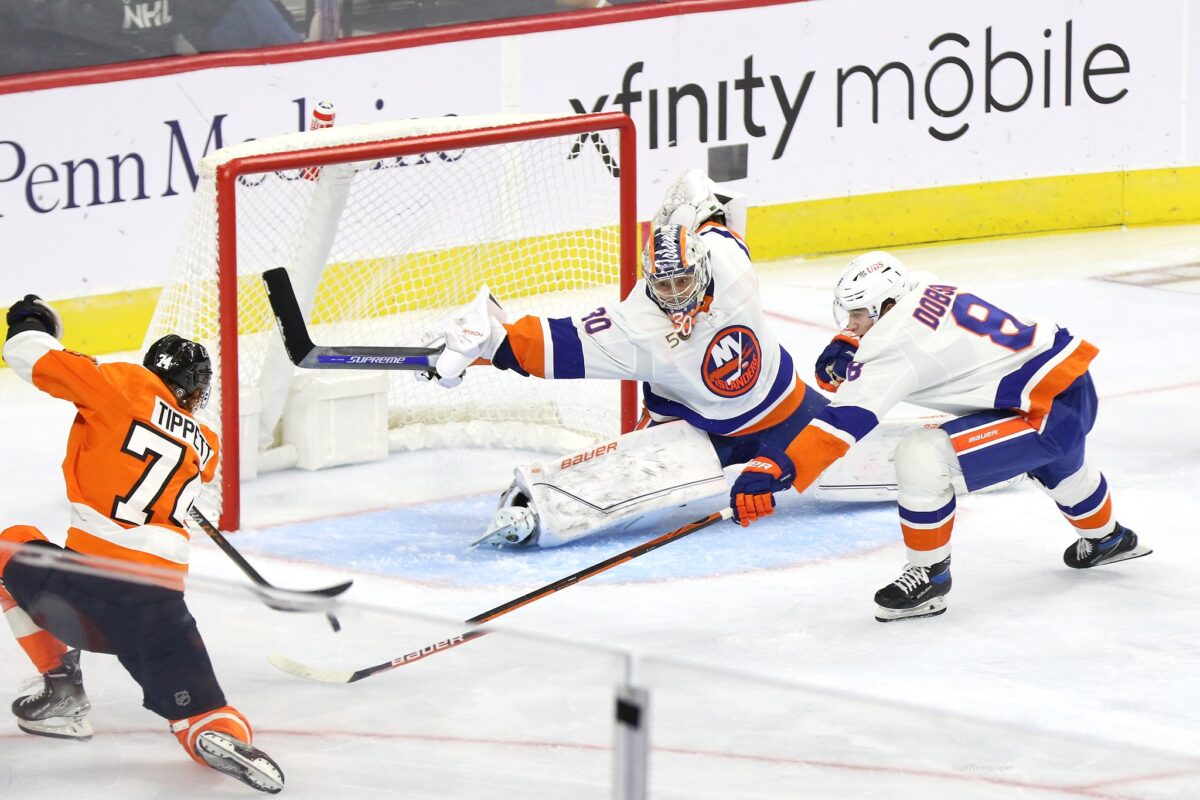It was a hard season for New York Islanders goaltender, Ilya Sorokin. He finished the 2022-23 season as a Vezina Trophy finalist behind Boston Bruins goaltender Linus Ullmark. Expectations were sky-high, and they were only enhanced as he signed an eight-year, $8.25 million average annual value (AAV) contract beginning in the 2024-25 season. However, his 2023-24 season was nothing short of a disappointment, and Islanders fans have grown worrisome as they move their attention to the 2024-25 season.
What Went Wrong for Sorokin?
Sorokin finished the season with a 25-19-12 record, owning a 3.01 goals-against average (GAA) and a .909 save percentage (SV%). These are not atrocious numbers, but coming off of a 31-22-7 season with a 2.34 GAA and a .924 SV% made this season look terrible.
Related: New York Islanders’ Unrealistic Trade Partners for Ilya Sorokin
On the ice, Sorokin did not look to be struggling. There were many goals that felt as if no goaltender would save them, and he was purely getting unlucky. While it is hard to say he got unlucky over a 56-game stretch, he truly did. He finished the season fifth in expected goals against (xG), according to Money Puck. He also finished with a higher xG against per 60 minutes than any other goalie with more than 50 starts. Plain and simple, the Islanders’ defense struggled when Sorokin was in the net.
Despite this, Sorokin continued to amaze, positioning himself well with shots around the net. At even strength, the one place he truly struggled was on low-danger shots. He would give up a lot of soft goals, and they would typically come from weak shots from the point. This could be pinned on poor defense, losing his vision, or losing his concentration, but it is likely a result of factors not related to him. He has never had this issue in his professional career before, and the only factor that is different now from before is the team in front of him. The Islanders’ defense was bad this season, and nowhere more did it show than on the penalty kill.
Sorokin’s Penalty Kill Woes
The Islanders finished the season with the worst penalty kill in the NHL, and this can be attributed to many factors. The defense saw three of its regulars spend stints on the long-term injured reserve, the team underwent a coaching change mid-season, and they had poor game plans. Sorokin finished the season with 1.4 goals saved above expected (GSAx), but minus-8.5 on the penalty kill.

This makes sense for a few reasons. The first is that he gave up a lot of low-danger shots from the point. These shots are given a low-danger designation, so it hurts the GSAx statistic all the more when he lets one into the net. Also, the Islanders’ defense struggled to contain the center of the ice on the penalty kill, so he would have to be constantly repositioning to account for potential passes and shots from all over the ice.
A great way to better understand the Islanders’ penalty kill struggles is to look at the season of Los Angeles Kings’ goaltender, Cam Talbot. Talbot, aged 36, is arguably the worst goaltender on shots from around the crease in the NHL. However, he led the league with 10.6 GSAx on the penalty kill because of the Kings’ defensive abilities to minimize shots from around the net. The team had the second-best penalty kill success rate in the NHL with 84.58%, a stark contrast to the Islanders’ 71.49%.
Their success came from pressuring the opposition and playing to their goaltender’s strengths to optimize the results. Sorokin has never struggled with long-distance shots before, but there is a lesson to be learned. The constant passing, low-pressure system the Islanders equipped did not work, especially for Sorokin. For next season, the penalty kill needs to eliminate one side of the ice and force predictable shots for Sorokin. It will not be easy, but returning to full health and deploying new tactics is one way to improve Sorokin’s play.
Other Islanders Report Cards
Final Grade: C+
Giving Sorokin such a poor grade may seem overly harsh. His season for most goaltenders was fine, so it may seem unfair to deem his season so poor. However, expectations for the netminder are higher than anyone else on the team, so anything short of a borderline-MVP-caliber season is going to receive some negative feedback.
Goaltenders are products of the systems they play in, and the Islanders’ reliance on Sorokin to lead them to success is a lesson they must learn to improve going forward. As the team heads into the offseason, they must find a way to build around Sorokin while also creating a foundation that can find success without reliance on their netminder.
